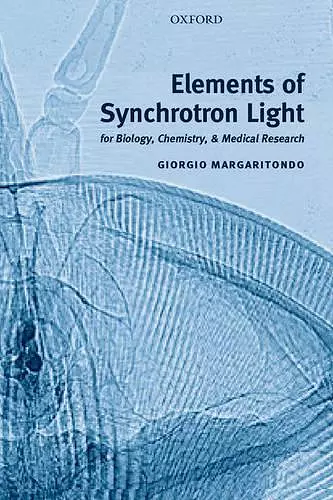Elements of Synchrotron Light
for Biology, Chemistry, and Medical Research
Format:Hardback
Publisher:Oxford University Press
Published:31st Oct '02
Currently unavailable, and unfortunately no date known when it will be back
This hardback is available in another edition too:
- Paperback£95.00(9780198509318)

This is a very simple but complete description of synchrotron sources and free electron lasers and of the corresponding instrumentation and techniques written primarily for scientists and students in the life sciences, medical research and chemistry. Scientists and students in other fields can also profit from a clear and elementary introduction to this rapidly expanding field. The emphasis is on simple concepts and the mathematical formalism is reduced to a minimum. No advanced knowledge of physics and mathematics is required beyond a standard elementary background. The reading is facilitated by a two-level presentation including a very simple descriptive treatment, and slightly more in-depth discussions of specific topics. With the first-level treatment, the readers will be able to understand the notions, terms, and techniques that are required to use a synchrotron facility. The book is therefore an ideal first step for all those beginning to use synchrotron light for their work or are considering such a possibility. The book is also suitable as a text for undergraduate courses as well as for specialized schools and continuing education courses. Thesis advisors active in synchrotron research will find it very useful as a first general introduction for their beginning graduate students. The treated topics include the basic functioning mechanisms of synchrotrons and free electron lasers, a description of synchrotron-based techniques in x-ray imaging and radiology, spectroscopy, microscopy and spectromicroscopy, EXAFS, crystallography and scattering (with special emphasis on macromolecular crystallography), microfabrication, and other techniques. The work is concluded by an analysis of the forseeable future developments in this field.
a useful and refreshing treatment of synchrotron radiation. * A.M. Glazer, University of Oxford *
a unique source of information, * A. Snigirev, ESRF Grenoble *
will appeal to all synchrotron radiation users * D.M. Lawson, Biological Chemistry Dept, John Innes Centre, Norwich *
ISBN: 9780198509301
Dimensions: 240mm x 162mm x 19mm
Weight: 604g
270 pages